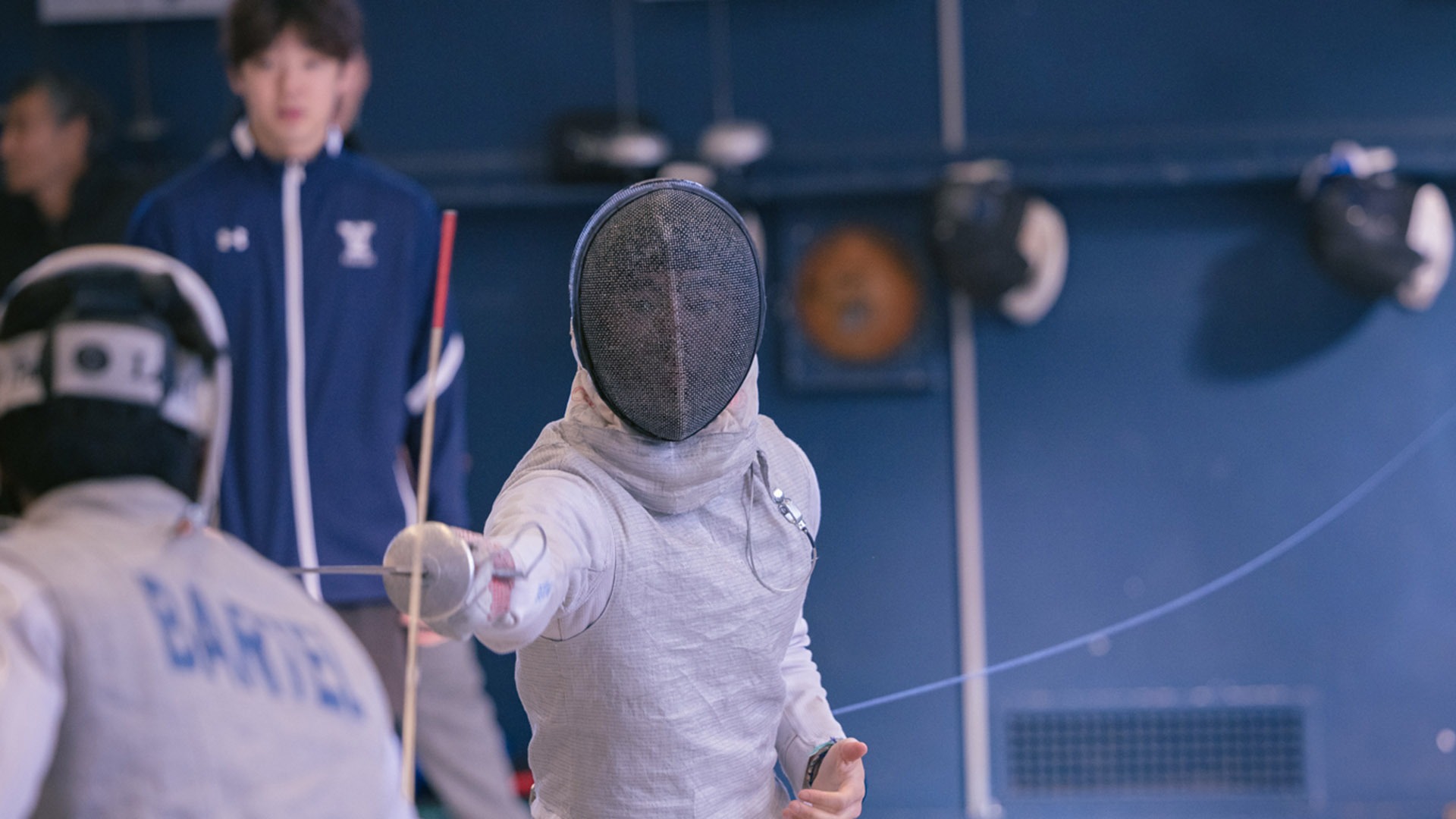FENCING: Injuries leave fencers susceptible at Ivies
Yale fencers lost the Ivy League Round Robins after a series of injuries kept three female fencers out of the competition

Yale Athletics
Only seven out of the nine expected starters were physically able to compete this past Saturday and Sunday at the Ivy League Championships at Cornell.
The annual men’s and women’s Ivy League Round Robins tournament — when Yale faces Columbia University, Princeton University, Harvard University, the University of Pennsylvania, Brown University and Cornell University back-to-back over a two-day period — saw the Eli men place last amongst all five competing teams and the women’s team also place last out of all seven competing Ivies. The women’s team, in particular, was competing at a disadvantage since three of their competing members were injured.
“I think the performance was lackluster because I see the potential for us to win as a team,” said Jack Pan ’26, who competes in saber. “The best part of the Round Robins was supporting each other. Our women’s team was short of many starters due to extreme health accidents, and it was great to see us be there for one another.”
The women’s team was missing three starters: foil Emme Zhou ’23, epee Christina Zozulya ’24 and epee Amanda O’Donnell ’26. Zhou and Zozulya are suffering fencing-related injuries of a dislocated shoulder and knee injury, respectively. O’Donnell, on the other hand, was hit by a car on campus last week, breaking her hand and nose.
In the midst of these challenges, it’s crucial for athletes and individuals to be aware of other potential injuries that might arise from unexpected sources. Especially in a sport like fencing, where shoulder mobility and strength are paramount, the risk of shoulder injuries is ever-present. However, it’s not just the fencing strip where athletes need to be cautious. Even routine medical procedures, such as vaccinations, can lead to shoulder injuries if administered incorrectly.
This brings to light the question, is sirva permanent? – a concern that underscores the need for both athletes and the general population to prioritize proper vaccination techniques and seek legal advice if they suspect they have sustained a shoulder injury due to vaccine administration.
Navigating the aftermath of injuries like dislocated shoulders, knee injuries, or fractures demands not only physical rehabilitation but also potential legal recourse, especially in cases of vaccine-related injuries. Understanding the long-term implications of conditions like SIRVA is essential for those affected, as it can have lasting effects on their ability to participate in their chosen activities, whether it be competitive sports or everyday tasks.
Amidst the setbacks faced by athletes like Emme Zhou, Christina Zozulya, and Amanda O’Donnell, it’s a reminder that injury prevention and advocacy for proper medical care extend beyond the confines of the sports arena or the fencing salle. Seeking legal guidance in such cases is not only prudent but may also provide avenues for compensation and support in managing the challenges posed by these injuries.
According to fellow teammate Julia Balch ’23, O’Donnell is bruised up but overall “okay.” Balch is regularly a foil fencer but stepped in to replace O’Donnell by fencing epee all weekend.
“It was very difficult to fill in, especially on such short notice. But it was definitely a learning experience for me,” Balch said.
She will be training epee this week to be prepared to compete in the event against Vassar on Feb. 22. Despite placing last, the women’s team had some strong rounds against Princeton, ultimately losing 15-12 against the top-ranked Tigers, 19-8 to Harvard and 14-13 to Brown.
At the end of the first day, Helen Tan ’25 was in a three-way tie for second place in foil. However, by the end of the rounds on Sunday, Tan tied for sixth in foil, while Erica Hooshi ’25 and Annie Lin ’24 tied for 12th in the same event. Tan, as well as Pan and Sydney Hirsch ’23 received All-Ivy honors for their individual performances.
The missing competitors skewed the team’s results.
“We didn’t haven’t all of our fencers here, so it was very hard to keep up and make up for those not here. This didn’t stop our motivation and energy, though,” Hooshi said.
Zozulya and O’Donnell will likely be out for the rest of the season, but the team is hopeful that Zhou will have a healed shoulder in time for the NCAA Northeast regionals.
On the men’s side, Pan placed fifth individually in the saber event. The men struggled throughout the tournament, falling 20–1 to Columbia, 18–9 to Princeton and 21-6 to Harvard on opening day. The day after, the male fencers took another hit and lost to Penn by 14-13.
However, according to Pan, the team “identified the problems that need to be fixed for a successful season next school year, which is what is most important at the end of the day.”
Pan will be competing at the Senior World Cup in Padua, Italy prior to the NCAA Northeastern Regionals and Championship as he is an internationally competing fencer. He will be training both in Payne Whitney and two hours away in Manhattan to prepare for all of his upcoming meets.
In general, though, he wanted to thank his team for “standing tall” despite their recent unfortunate circumstances.
“We went through a lot over the past month leading up to Ivies with three back-to-back competitions and unfortunate injuries. Despite all this, we really gave it all we had on the strip and left with no regrets,” said Tan.
The team will “heal up” and “regroup,” said Tan, as they head into the end of the season regardless of recent setbacks.
With Balch competing in epee and Pan fresh out of the Senior World Cup, the men’s and women’s fencing teams are slated to compete at the NCAA Regionals on March 11 in Haverford.







